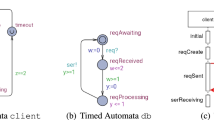Abstract
This paper presents an optimization based framework to automate system repair against omega-regular properties. In the proposed formalization of optimal repair, the systems are represented as Kripke structures, the properties as \(\omega \)-regular languages, and the repair space as repair machines—weighted omega-regular transducers equipped with Büchi conditions—that rewrite strings and associate a cost sequence to these rewritings. To translate the resulting cost-sequences to easily interpretable payoffs, we consider several aggregator functions to map cost sequences to numbers—including limit superior, supremum, discounted-sum, and average-sum—to define quantitative cost semantics. The problem of optimal repair, then, is to determine whether traces from a given system can be rewritten to satisfy an \(\omega \)-regular property when the allowed cost is bounded by a given threshold. We also consider the dual challenge of impair verification that assumes that the rewritings are resolved adversarially under some given cost restriction, and asks to decide if all traces of the system satisfy the specification irrespective of the rewritings. With a negative result to the impair verification problem, we study the problem of designing a minimal mask of the Kripke structure such that the resulting traces satisfy the specifications despite the threshold-bounded impairment. We dub this problem as the mask synthesis problem. This paper presents automata-theoretic solutions to repair synthesis, impair verification, and mask synthesis problem for limit superior, supremum, discounted-sum, and average-sum cost semantics.
This work was supported by the National Science Foundation (NSF) under Grant ECCS-2015403 and NSF CAREER award CCF-2146563.
Access this chapter
Tax calculation will be finalised at checkout
Purchases are for personal use only
Similar content being viewed by others
References
Bansal, S., Chaudhuri, S., Vardi, M.Y.: Comparator automata in quantitative verification. In: Baier, C., Dal Lago, U. (eds.) FoSSaCS 2018. LNCS, vol. 10803, pp. 420–437. Springer, Cham (2018). https://doi.org/10.1007/978-3-319-89366-2_23
Cerný, P., Henzinger, T.A.: From boolean to quantitative synthesis. In: International Conference on Embedded Software, EMSOFT 2011, pp. 149–154 (2011)
Chatterjee, K., Doyen, L., Henzinger, T.A.: Quantitative languages. In: Kaminski, M., Martini, S. (eds.) CSL 2008. LNCS, vol. 5213, pp. 385–400. Springer, Heidelberg (2008). https://doi.org/10.1007/978-3-540-87531-4_28
Chatterjee, K., Doyen, L., Henzinger, T.A.: A Survey of stochastic games with limsup and liminf objectives. In: Albers, S., Marchetti-Spaccamela, A., Matias, Y., Nikoletseas, S., Thomas, W. (eds.) ICALP 2009. LNCS, vol. 5556, pp. 1–15. Springer, Heidelberg (2009). https://doi.org/10.1007/978-3-642-02930-1_1
Chatterjee, K., Henzinger, T.A., Otop, J., Velner, Y.: Quantitative fair simulation games. Inf. Comput. 254, 143–166 (2017)
Chatterjee, K., Henzinger, T.A., Piterman, N.: Algorithms for Büchi games. arXiv preprint. arXiv:0805.2620 (2008)
Chhetri, S.R., Canedo, A., Faruque, M.A.A.: Confidentiality breach through acoustic side-channel in cyber-physical additive manufacturing systems. ACM Trans. Cyber-Phys. Syst. 2(1), 1–25 (2017)
D’Antoni, L., Samanta, R., Singh, R.: Qlose: program repair with quantitative objectives. In: Chaudhuri, S., Farzan, A. (eds.) CAV 2016. LNCS, vol. 9780, pp. 383–401. Springer, Cham (2016). https://doi.org/10.1007/978-3-319-41540-6_21
Dave, V., Krishna, S., Murali, V., Trivedi, A.: Optimal repair for omega-regular properties (2022). arxiv.org/abs/2207.13416
Filiot, E., Mazzocchi, N., Raskin, J., Sankaranarayanan, S., Trivedi, A.: Weighted transducers for robustness verification. In: International Conference on Concurrency Theory, CONCUR 2020, pp. 17:1–17:21 (2020)
Henzinger, T.A., Doyen, L., Chatterjee, K.: Expressiveness and closure properties for quantitative languages. In: Logic in Computer Science, Symposium on, pp. 199–208 (2009)
Henzinger, T.A., Otop, J.: From model checking to model measuring. In: D’Argenio, P.R., Melgratti, H. (eds.) CONCUR 2013. LNCS, vol. 8052, pp. 273–287. Springer, Heidelberg (2013). https://doi.org/10.1007/978-3-642-40184-8_20
Jobstmann, B., Griesmayer, A., Bloem, R.: Program repair as a game. In: Etessami, K., Rajamani, S.K. (eds.) CAV 2005. LNCS, vol. 3576, pp. 226–238. Springer, Heidelberg (2005). https://doi.org/10.1007/11513988_23
Kupferman, O., Tamir, T.: Coping with selfish on-going behaviors. Inf. Comput. 210, 1–12 (2012)
Puterman, M.L.: Markov Decision Processes: Discrete Stochastic Dynamic Programming, 1st edn. John Wiley & Sons Inc., USA (1994)
Samanta, R., Olivo, O., Emerson, E.A.: Cost-aware automatic program repair. In: Müller-Olm, M., Seidl, H. (eds.) SAS 2014. LNCS, vol. 8723, pp. 268–284. Springer, Cham (2014). https://doi.org/10.1007/978-3-319-10936-7_17
Vardi, M.Y., Wolper, P.: An automata-theoretic approach to automatic program verification. In: Proceedings of the First Symposium on Logic in Computer Science, pp. 322–331. IEEE Computer Society (1986)
von Essen, C., Jobstmann, B.: Program repair without regret. Formal Methods Syst. Des. 47(1), 26–50 (2015). https://doi.org/10.1007/s10703-015-0223-6
Zwick, U., Paterson, M.: The complexity of mean payoff games on graphs. Theoret. Comput. Sci. 158(1), 343–359 (1996)
Author information
Authors and Affiliations
Corresponding author
Editor information
Editors and Affiliations
Rights and permissions
Copyright information
© 2022 The Author(s), under exclusive license to Springer Nature Switzerland AG
About this paper
Cite this paper
Dave, V., Krishna, S.N., Murali, V., Trivedi, A. (2022). Optimal Repair for Omega-Regular Properties. In: Bouajjani, A., Holík, L., Wu, Z. (eds) Automated Technology for Verification and Analysis. ATVA 2022. Lecture Notes in Computer Science, vol 13505. Springer, Cham. https://doi.org/10.1007/978-3-031-19992-9_23
Download citation
DOI: https://doi.org/10.1007/978-3-031-19992-9_23
Published:
Publisher Name: Springer, Cham
Print ISBN: 978-3-031-19991-2
Online ISBN: 978-3-031-19992-9
eBook Packages: Computer ScienceComputer Science (R0)




